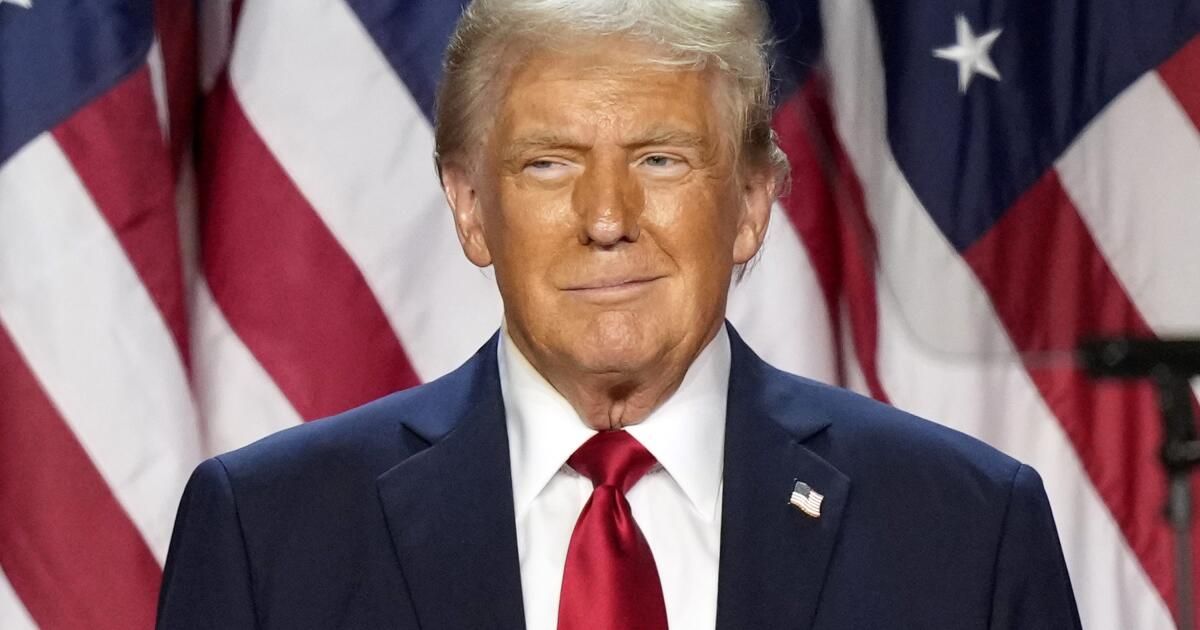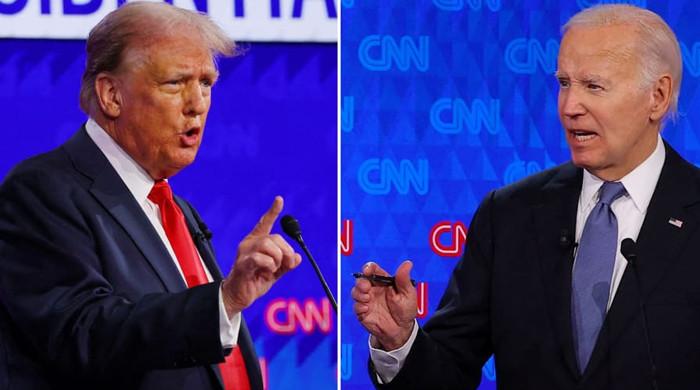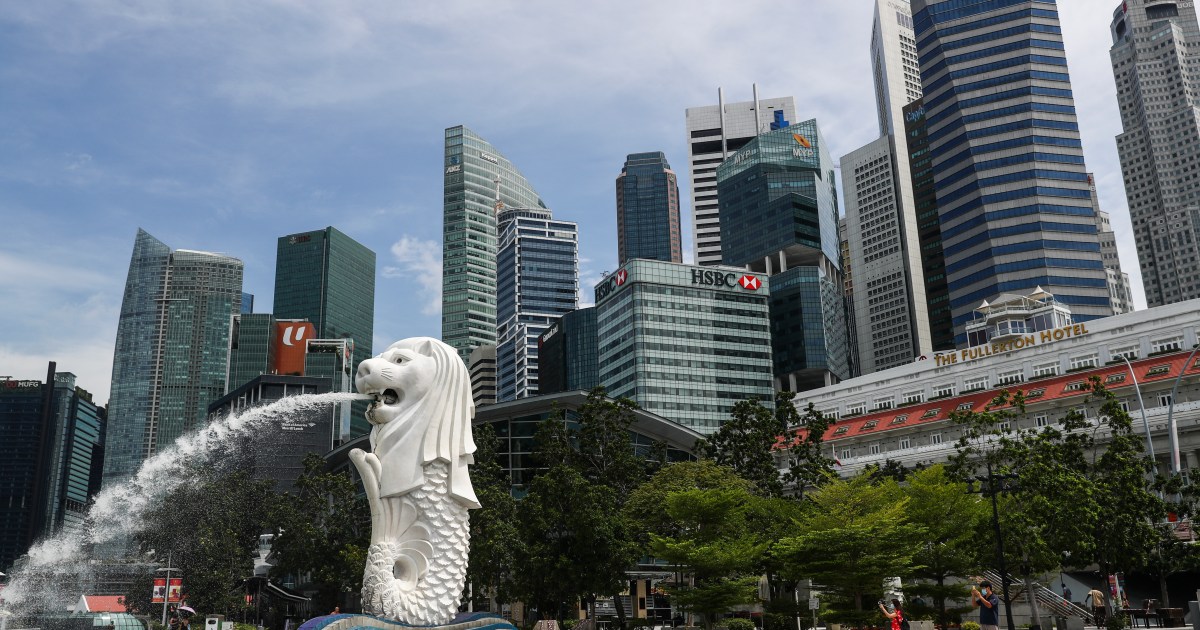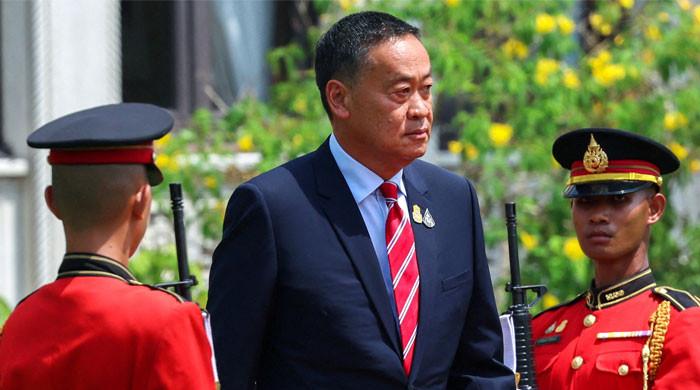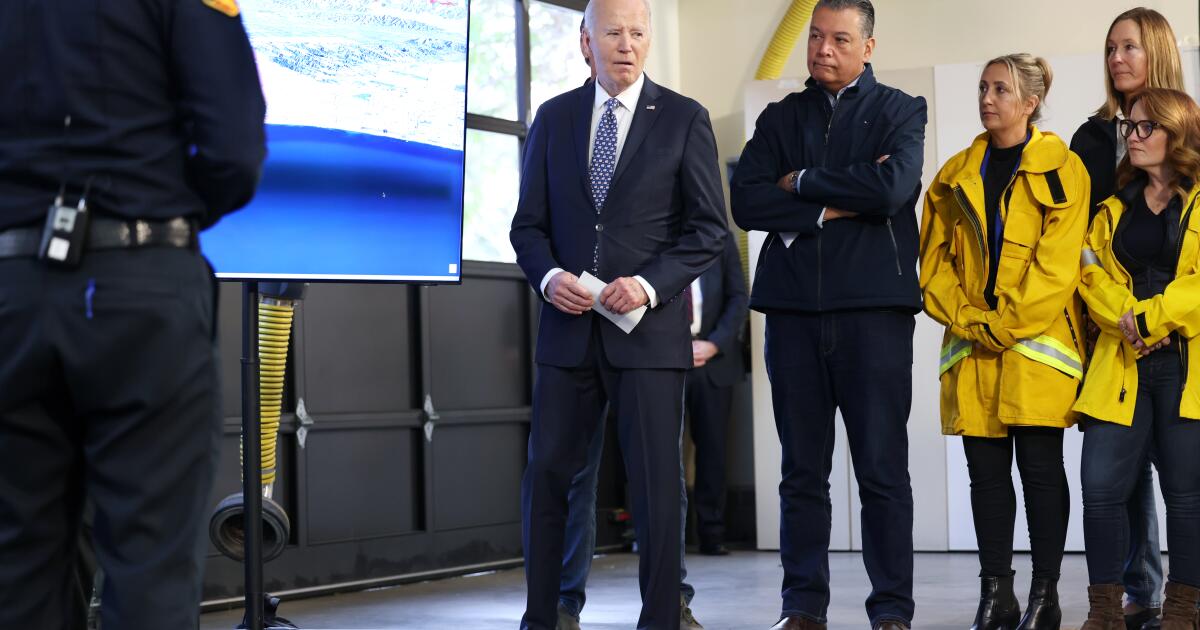WASHINGTON- President-elect Donald Trump made hundreds of promises during his campaign, including dozens that he promised to implement from “day one” of his administration. At the top of the list: the closure of the US border with Mexico, mass deportations, increased oil and gas production and retaliation against his political opponents.
Many of his proposals would hit California hard, and Gov. Gavin Newsom has already vowed to wage war in the courts against the new administration.
There are plenty of things to worry about on Trump's wish list. But as I wrote when he was elected to his first term, you can't push all the panic buttons at once.
Here is an attempt to separate the larger concerns from the smaller ones. Which Trump priorities are worth losing sleep over, and which ones will he find difficult to carry out?
Your highest priorities, some with complications
Deport undocumented immigrants
“Close the border” has been Trump's shorthand for a draconian crackdown on illegal immigration. He has repeatedly promised to launch “the largest internal deportation campaign in American history.”
A campaign to expel all undocumented immigrants would deprive California of more than 7% of its workforce, potentially cripple agriculture and construction, divide families, and disrupt communities.
It would also face a practical problem: The federal government does not have enough immigration agents to arrest 11 million people.
This is a promise that Trump clearly intends to keep. But there may be a debate in the new administration about how swift and broad the deportation campaign should be.
“It is not going to be a massive sweep of neighborhoods. This is not about building concentration camps,” Tom Homan, former acting director of ICE under Trump, said last month on CBS’ “60 Minutes.”
Polls show that most Americans want stricter enforcement of immigration laws but do not support indiscriminate deportations, especially if they divide families. Here's how Trump's first-term crackdown turned into a political disaster, forcing him to back down.
Environmental setback
Trump has the plans and the power to roll back some environmental advances. The first day is expected to open more federal lands and coastal waters to oil and gas drilling. He is also likely to ease restrictions on the oil industry's emissions of methane, a potent greenhouse gas, and reverse Biden's pause on increasing liquefied petroleum gas exports.
Trump also plans to roll back Biden's efforts to encourage the adoption of electric vehicles and repeal federal subsidies for solar, wind and other renewable energy projects, important parts of California's push to wean itself off fossil fuels. But a full repeal of Biden's 2022 energy law could face resistance from Republicans in Congress, because much of the program's spending has flowed to Republican districts.
The new administration is also likely to delay permitting for new offshore wind projects. Trump has vociferously opposed wind energy since Scotland built a wind farm that ruined the view from one of its golf resorts.
Rates
“For me, the most beautiful word in the dictionary is tariff,” the president-elect said last month. He has proposed tariffs of at least 10% on goods from all other countries and at least 60% on China, and up to 200% on Mexico.
A president has broad authority to impose tariffs, and Trump has been so voluble about his love of trade barriers that they seem inevitable. But tariffs, which are essentially taxes on imports, pose two problems. They raise the prices of many of the goods Americans buy, raising inflation and almost always prompting other countries to retaliate by imposing tariffs on American exports.
Amid Trump's first-term trade war with China, Beijing slapped retaliatory tariffs on California farmers; Economists estimated that California almond growers, the state's most valuable export crop, lost about $875 million.
Revenge
Trump has threatened to order the Justice Department to prosecute a long list of his political opponents, including Vice President Kamala Harris, Senator-elect Adam B. Schiff and former US Representative Liz Cheney.
That's not a new impulse on your part. During his first term, he publicly demanded that Atty. General William Barr arrested Biden, former President Obama and former Secretary of State Hillary Clinton for what he claimed was a “treasonous plot” to spy on his 2016 campaign. (Barr ignored the order.)
If Trump appoints a more docile attorney general this time, he has the power to order the Justice Department to investigate his critics, a Republican lawyer who reportedly advises the president-elect wrote last week. The department's independence from political meddling is a long-standing norm, but it is not protected by law.
Still, if he attacks his critics, his tenure will be dominated by legal storms, which could hamper the rest of his agenda. Last month, he said he refrained from prosecuting Clinton during her first term because “it would seem terrible,” an implicit bow to political limitations.
Trump is virtually certain to take two actions: He will order the Justice Department to drop the federal criminal case against him stemming from his attempt to overturn Biden's election and his hiding of national security documents at his Florida property. He also promised to pardon most of the more than 1,000 people convicted or charged in the assault on the Capitol on January 6, 2021.
if he can
Foreign policy
A president's power to change the direction of foreign policy is nearly unlimited, and Trump has promised to do exactly that. He has promised to negotiate an end to the Russian invasion of Ukraine even before he takes office, and his other statements suggest he would do so by demanding that Ukraine hand over parts of its territory. (His running mate, Vice President-elect JD Vance, has called for an immediate end to military aid to Ukraine.)
Trump is also likely to renew his first-term push to pull the United States out of the 75-year-old North Atlantic Treaty Organization, or at least weaken the American commitment to defending European countries against a Russian invasion.
Install loyal
Trump has promised to impose new rules on the federal civil service that will allow him to more easily fire bureaucrats and replace them with loyalists. He imposed that rule in the final months of his first term, but Biden revoked it.
He has also promised to fire high-ranking military officers whose political views he does not like and to purge the CIA and FBI, accusing both agencies of “persecuting” conservatives.
Such measures “would turn much of the public administration into an army of fools,” Robert Shea, a former aide to President George W. Bush, told me this year.
Trump versus political reality
Abortion
One issue where Trump may hesitate to buck public opinion: abortion. Polls show that most voters oppose tougher restrictions, and last week, voters in seven states, including conservative Missouri and Montana, approved abortion rights measures.
During this year's Republican primaries, Trump sought to take credit for nominating conservative Supreme Court justices who allowed states to pass restrictive abortion laws. But once he ran in a general election campaign, he tried to avoid responsibility for the laws, arguing that he had left the issue in the hands of the states.
Some anti-abortion activists want Congress to pass a national abortion ban, but Trump said during the campaign that he would not sign a law. Trump has also indicated that he has no intention of blocking access to mifepristone, the pill used in more than half of abortions in the United States. “The matter is resolved,” his spokeswoman, Karoline Leavitt, said last month.
Activists hope the Trump administration will rescind a Biden directive requiring emergency rooms to perform abortions when necessary to stabilize a woman's health, even in states with abortion bans.
Obamacare
Conservative Republicans in Congress, including House Speaker Mike Johnson (R-La.), have said they hope to repeal or weaken the Affordable Care Act, the health insurance law popularly known as Obamacare.
Trump has said he is open to changing the popular law, which he tried unsuccessfully to repeal in his first term. But he has not presented a proposal and admitted in the debate that he only had “concepts of a plan.”
If the new Congress fails to renew Biden-era subsidies, up to 20 million users (especially middle- and high-income families) will see their health insurance costs increase.
Not likely to happen
Some of Trump's promises are unlikely to survive in the real world.
He promised to exempt Social Security benefits, overtime wages and tips from taxes. Many Republicans in Congress say privately that such ideas are impractical because they would cost trillions in lost revenue.
Trump also promised that his pro-oil policies would reduce energy prices by 50%. But energy prices are set by a global market; Even if Trump stimulates a massive increase in oil production (which is not certain), the effect on prices may not be dramatic.
Trump has also threatened to cancel the broadcast licenses of television networks. But the federal government licenses individual stations, not networks, and can't cancel licenses because a president doesn't like their news coverage.
Where are the restrictions?
Trump, like all presidents, will have great power. But even a strong man may discover that there are limits to what he can do.
Courts can still overturn an administration's actions, and Democrats, including California's governor, are preparing to spend much of the next four years going to court.
The most important factor could be public opinion. Trump may have run his final campaign, but Republicans in Congress face another election in two years. They know that voters often punish the party in power, especially if they believe the president has gone too far.
Therefore, the 2026 congressional elections may be the strongest constraint on what Trump can do, and that campaign is already underway.

